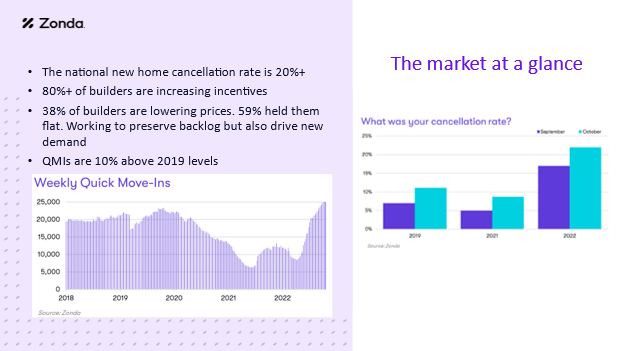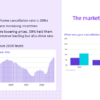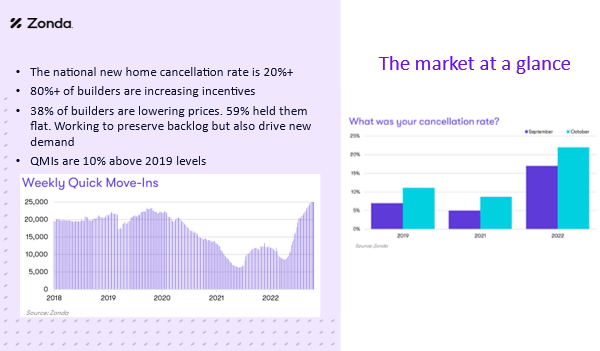Charlotte December 2023 – Key Take Aways
• Jay Faison – 2040 Foundation – Jay founded the nonprofits, ClearPath and 2040 Foundation, with the mission to impact policies that accelerate clean energy innovation and reduce and remove global emissions. He teams with other social entrepreneurs within the climate space to create organizations that work on the state and federal level, such as the First Street Foundation and the American Flood Coalition. His goal with climate risk is to connect climate and financial risk, particularly how climate change is going to affect the mortgage market. Currently, the effects of climate change are well underway yet the acceptance of this is fairly new.
• Incremental temperature increases lead to exponential outcomes and disasters. Wildfires are at a 68% increase in annual acres burned and 9,000,000 acres forecast in the future. More forest fires mean less trees and that reduces supply which increases prices. According to the Department of Energy’s analysis, climate change is only half of the force that contributes to the problem. Forest management practices are lacking and largely contribute as well.
• Voters dislike increased insurance prices and place pressure on politicians and so politicians place caps on insurance prices. This artificial cap squeezes insurance margins for years and forces insurers to leave the market or close business, which is occurring especially in California. Some states, like Florida, are backstopping some of these policies because people become destitute and desperate when they cannot insure, and it is not a good look politically.
• Flood insurance is 95% heavily subsidized, federal insurance. Congress is attempting to kill FEMA’s Risk Rating 2.0, which adjusts flood insurance pricing based on climate conditions. They have an 18% cap on flood insurance prices if grandfathered in. Those who are not grandfathered in or buy a new house or new insurance policy, are getting spiked flood insurance increases. Louisiana (below the levee) is underwater on mortgage alone. The average home in Louisiana that receives a non-renewal could instantly lose 26-48% of value. West Virginia per capita is the most flood affected place in the country. On the other hand, Charlotte city and county are very cooperative and have an excellent model for which they follow. Charlotte water is nationally recognized. Luckily, flooding is non-partisan and people are pushing for more change.
• In the Floridian and Carolinian wind insurance markets, reinsurers are primarily incorporating climate into their wind insurance models along with nefarious construction practices that are driving up insurance premiums. The data reveals the size, not the quantity, of hurricanes are growing larger and reclassification for hurricane categories should be reconsidered. Hurricanes are coming further north, now hitting places like Jacksonville, FL up to the Wilmington, NC area. Places that are rated at a CAT3 or lower would be destroyed by a CAT4 or higher hurricane. The buildings would massively devalue, and insurance would not cover reparations whatsoever.
• There will be players in the game who will get smart about climate change and others who will be left in a jam. The solution? The banks need to stop lending, the insurers need to stop insuring and the government needs to stop allowing people to build in places that we shouldn’t build in. The hard part is dealing with the people who already live in these natural disaster regions. There is no good answer, but a good start is untangling and consolidating federal policy so that States have control of better data and incentives to build their own. Go to riskfactor.com for a more in-depth report on cursory information.
• Brian Gullette and John Culbertson – Cardinal Partners – Brian and John are focused on large housing development projects mostly in the Carolinas. Entitlement pushback has never been stronger, yet demand has never been higher. They have been getting more creative in deals, trying to bring in non-traditional partners and others within the business community. They currently have a project in Pickens, SC, that is causing some very interesting political turmoil. They recommend when a town or community passes UDO, to stand behind it and quit trying to snowball and drag things on so that housing may get up off the ground.
• Guillermo Matias – Avery Hall – Avery Hall is a boutique, multi-family developer from New York. Guillermo’s role within the company is on the operation and procedures side. Unfortunately, the company has had to halt some projects because of construction costs, particularly one in South End. However, they have two projects underway in the Charleston and Greenville, SC area.
• Drew Gaertner – University City Partners – Drew is University City Partner’s newest Economic and Land Development Manager. The group supports the municipal service district that is in the University City area. They strongly encourage anyone interested in University City for development to reach out.
• Joe Kinsey – CoStar – Joe agrees with Jay regarding how many full deals fall out or change drastically because of insurance quotes. He reports 31,000 units of construction supply underway in Charlotte. A record high of empty industrial space is on the market now.
• Amy Rickers – Johnston Allison Hord – Amy practiced environmental law for twenty years in Texas before coming to Charlotte. Her expertise helps clients from the real estate side of environmental law to the corporate side of it, particularly in brownfield work.
• Neal McElveen – Terracon – Rainfall amounts are growing. Regulations need to change in order for the design and infrastructure to follow. Transactions keep coming steady and he predicts will only continue to grow.
• Griffin Gum – Rosegate Mortgage – Griffin has been at Rosegate Mortgage for two months now. From a market perspective, rates have been improving and create potential for more refinance opportunities and purchases.
• Gates Grainger – Investor Title Company – Gates handles commercial title insurance on deals but is especially savvy at connecting and recommending qualified people so that more deals can happen. Commercial has slowed down within the past couple of years but is slowly rising each month that passes.
• Brent Kubitschek – Waterstone Multi-Housing Advisors – Interest rates are beginning to come down and activity is picking up on the buyer’s side.
• Charles Seaman – Cash Flow Champs – Charles focuses on the syndication structures on the multifamily side. He would like to shift to different asset classes, surprisingly office and retail, and to a more private equity model in the future.






Recent Comments